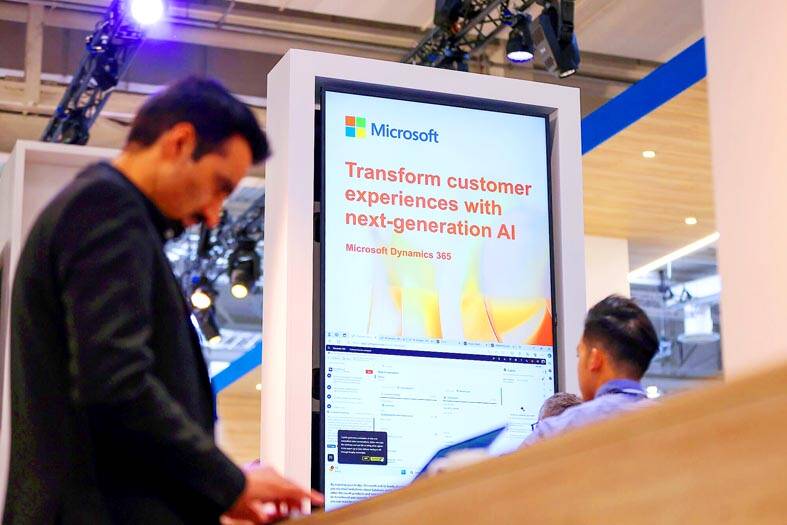Google and Microsoft Corp shares rallied yesterday as the technology bellwethers showed that hefty investments into artificial intelligence (AI) could reap more immediate revenue returns, a sharp contrast to Meta Platforms Inc’s view that AI is a long-term bet.
Microsoft’s shares advanced 3.84 percent in trading before the US market opened, after the company beat Wall Street estimates for third-quarter revenue and profit, driven by gains from the adoption of AI across its cloud services.
Google-parent Alphabet Inc soared an even-steeper 11.5 percent, poised to top US$2 trillion in market value, after not only beating quarterly estimates, but also rewarding investors with its first-ever dividend and a US$70 billion stock buyback plan.

Photo: Bloomberg
That sparked a 1 to 3 percent rise in the shares of other big technology companies, including Amazon.com Inc, Apple Inc, Nvidia Corp and even Meta Platforms, whose stock price tumbled more than 10 percent on Thursday as the social media firm signaled its costly AI bets could take years to pay off.
The technology titans have been locked in a fierce battle in the race for generative AI, which can create text, videos and photographs from prompts and is seen as the next frontier, but analysts are divided over whether Alphabet or Microsoft wears the AI crown.
“Microsoft continues to put together masterpiece after masterpiece as this quarter represents its dominant position in the AI revolution,” Wedbush Securities analyst Daniel Ives said.
However, Scott Devitt, Ives’ colleague at Wedbush, said: “We think the results further validate Google’s position as a leading AI beneficiary.”
Microsoft has access to OpenAI’s coveted AI technologies, which it has been working to infuse across its product portfolio, such as in Bing, Microsoft 365 and, most importantly, the Azure cloud-computing platform.
“AI services contributed seven points of growth” to the 31 percent jump in revenue from Azure, Microsoft finance chief Amy Hood said.
While Goldman Sachs said Microsoft is well-placed to replicate the success of its Azure buildout playbook in its AI-laced suite, Oppenheimer Holding Inc predicted the company’s AI dominance would be reminiscent of a couple of decades back.
“We see it revisiting its PC-era-type dominance, but of a 1,000 times larger market as it is the dominant AI platform for enterprises,” analyst Timothy Horan said.
On the other hand, Alphabet chief executive officer Sundar Pichai touted Google’s AI offerings as a boon to its market-leading service — core search results.
“Google’s Q1 ranked somewhere north of outstanding... and management appears in better control of its own AI narrative,” RBC analyst Khadijah Gibson said.
“Aside from a similarly-sized capex guide up as Meta, Google is more than weathering the GenAI concerns,” Gibson added.
If pre-market gains held, Alphabet, Wall Street’s fourth-most valuable company, would cross the US$2 trillion in market value on an intraday basis — a milestone it last hit, but failed to hold on to, three years ago, LSEG Datastream said.
Three of the so-called “Big Six” have reported quarterly results so far. Of the remaining, Amazon, now the only one that does not pay a dividend, is due to report results next week.

When an apartment comes up for rent in Germany’s big cities, hundreds of prospective tenants often queue down the street to view it, but the acute shortage of affordable housing is getting scant attention ahead of today’s snap general election. “Housing is one of the main problems for people, but nobody talks about it, nobody takes it seriously,” said Andreas Ibel, president of Build Europe, an association representing housing developers. Migration and the sluggish economy top the list of voters’ concerns, but analysts say housing policy fails to break through as returns on investment take time to register, making the

‘SILVER LINING’: Although the news caused TSMC to fall on the local market, an analyst said that as tariffs are not set to go into effect until April, there is still time for negotiations US President Donald Trump on Tuesday said that he would likely impose tariffs on semiconductor, automobile and pharmaceutical imports of about 25 percent, with an announcement coming as soon as April 2 in a move that would represent a dramatic widening of the US leader’s trade war. “I probably will tell you that on April 2, but it’ll be in the neighborhood of 25 percent,” Trump told reporters at his Mar-a-Lago club when asked about his plan for auto tariffs. Asked about similar levies on pharmaceutical drugs and semiconductors, the president said that “it’ll be 25 percent and higher, and it’ll

CHIP BOOM: Revenue for the semiconductor industry is set to reach US$1 trillion by 2032, opening up opportunities for the chip pacakging and testing company, it said ASE Technology Holding Co (日月光投控), the world’s largest provider of outsourced semiconductor assembly and test (OSAT) services, yesterday launched a new advanced manufacturing facility in Penang, Malaysia, aiming to meet growing demand for emerging technologies such as generative artificial intelligence (AI) applications. The US$300 million facility is a critical step in expanding ASE’s global footprint, offering an alternative for customers from the US, Europe, Japan, South Korea and China to assemble and test chips outside of Taiwan amid efforts to diversify supply chains. The plant, the company’s fifth in Malaysia, is part of a strategic expansion plan that would more than triple

Taiwanese artificial intelligence (AI) server makers are expected to make major investments in Texas in May after US President Donald Trump’s first 100 days in office and amid his rising tariff threats, Taiwan Electrical and Electronic Manufacturers’ Association (TEEMA, 台灣電子電機公會) chairman Richard Lee (李詩欽) said yesterday. The association led a delegation of seven AI server manufacturers to Washington, as well as the US states of California, Texas and New Mexico, to discuss land and tax issues, as Taiwanese firms speed up their production plans in the US with many of them seeing Texas as their top option for investment, Lee said. The